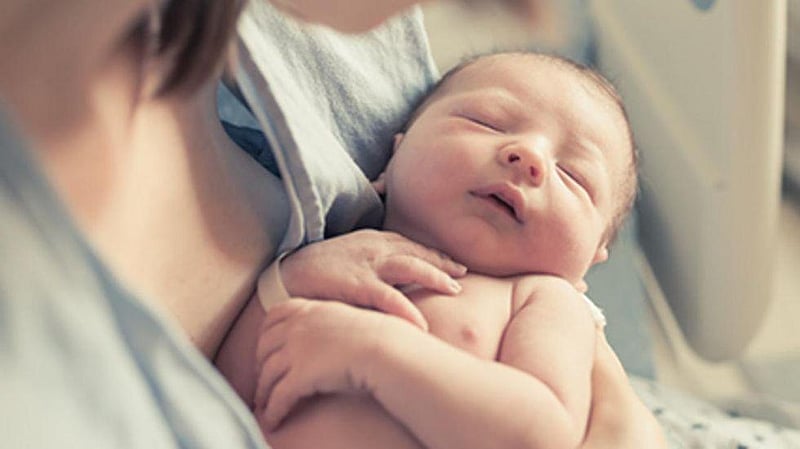Get Healthy!
60 Results for search "Childbirth".
Health News Results - 60
A two-minute test can accurately detect vaginal bacteria associated with preterm birth, researchers have found, pointing to a possible way to identify pregnant women at increased risk of early delivery.
In the United States, about one in 10 babies are born preterm, according to the nonprofit March of Dimes. Babies born preterm (before the 37th week of pregnancy) are at increased risk of h...
- HealthDay Reporter
- Amy Norton
- |
- November 1, 2021
- |
- Full Page
Among the many negative effects of the COVID-19 pandemic may be damage to the bond between mothers and their infants, researchers say.
Women who experienced grief and depression due to pandemic-related losses may find it more difficult to form this all-important emotional connection with their babies, according to a new study from Brigham and Women's Hospital, in Boston.
"Becoming a...
- HealthDay Reporter
- Cara Murez
- |
- October 18, 2021
- |
- Full Page
Women who were born with heart defects may get some reassurance from a new study that finds they face no heightened risk to health during a pregnancy and delivery.
According to the researchers, doctors may often advise these women against getting pregnant due to the potential risks for them and their babies, but until now those risks have been unclear.
"The most important finding fr...
- HealthDay Reporter
- Robert Preidt
- |
- October 18, 2021
- |
- Full Page
Pregnant women who receive an epidural to ease their pain during labor aren't any more likely than others to have kids with autism, two new studies show.
Earlier research suggested this practice may increase autism risk in offspring, but the pair of studies should put this concern to rest for good, experts say.
"Parents can be reassured that there is no link between using epidurals ...
- HealthDay Reporter
- Denise Mann
- |
- September 29, 2021
- |
- Full Page
Birth rates tend to fall during pandemics, and history is repeating itself with the COVID-19 scourge, researchers say.
Fewer babies have been born in much of Europe and the United States. Earlier in the pandemic, U.S. births declined 7%, a new study finds.
In Europe, birth declines varied. In Italy they dropped 9%, in Spain 8% and Portugal 7%, while in Denmark, Finland, Germany and ...
- HealthDay Reporter
- Steven Reinberg
- |
- September 20, 2021
- |
- Full Page
COVID-19 is surging in U.S. states with low vaccination rates, and these places may also be seeing a higher-than-usual number of stillbirths linked to the virus.
While the number of stillbirths is still very low nationally, doctors in the Deep South have noticed increases in stillbirths, NBC News reported.
One of those states is Alabama. But the numbers are too low overall ...
- HealthDay Reporter
- Cara Murez
- |
- September 13, 2021
- |
- Full Page
Leaky heart valves can put pregnant women at serious risk, according to a large study that runs counter to established practice.
The condition used to be considered relatively harmless during pregnancy. But this analysis by Johns Hopkins University researchers of more than 20,000 individual medical records reveals that heart valve disease puts women at risk for bleeding, high blood pressu...
- HealthDay Reporter
- Cara Murez
- |
- September 9, 2021
- |
- Full Page
First comes love. Then comes marriage. Then comes baby in the baby carriage.
While that childhood rhyme used to be true, college-educated women in the United States are now more likely than ever to have a first baby outside marriage. They're also more likely than other women to have a wedding ring by the time they have their second baby.
"It suggests a change in the way that college...
- HealthDay Reporter
- Cara Murez
- |
- September 7, 2021
- |
- Full Page
The health impact of wildfires is already huge, and new research suggests it might also raise a mom-to-be's risk for preterm birth, according to a new study.
Wildfire smoke contains high levels of PM 2.5, the deadliest type of pollution from particles so fine they can embed deep in the lungs and pass into the bloodstream.
"In the future, we expect to see more frequent and intense ex...
- HealthDay Reporter
- Cara Murez
- |
- August 26, 2021
- |
- Full Page
All births are not created equal, new U.S. research reveals: Differences in the quality of hospital care contribute to a higher chance of complications among Black and Hispanic newborns compared to white and Asian infants.
The analysis of more than 480,000 live births at term (at least 37 weeks' gestation) in New York City from 2010 through 2014 found that the overall rate of unexpected c...
- HealthDay Reporter
- Robert Preidt
- |
- August 25, 2021
- |
- Full Page













